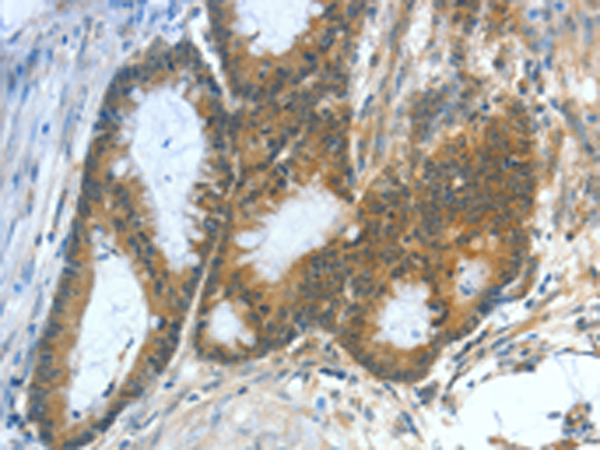

| WB | 咨询技术 | Human,Mouse,Rat |
| IF | 咨询技术 | Human,Mouse,Rat |
| IHC | 1/50-1/200 | Human,Mouse,Rat |
| ICC | 技术咨询 | Human,Mouse,Rat |
| FCM | 咨询技术 | Human,Mouse,Rat |
| Elisa | 1/1000-1/5000 | Human,Mouse,Rat |
| Aliases | TS11 |
| WB Predicted band size | 64 kDa |
| Host/Isotype | Rabbit IgG |
| Antibody Type | Primary antibody |
| Storage | Store at 4°C short term. Aliquot and store at -20°C long term. Avoid freeze/thaw cycles. |
| Species Reactivity | Human, Mouse, Rat |
| Immunogen | Fusion protein of human ASNS |
| Formulation | Purified antibody in PBS with 0.05% sodium azide and 50% glycerol. |
+ +
以下是关于ASNS抗体的3篇参考文献的简要列举(基于真实研究归纳,非虚构内容):
---
1. **文献名称**:*Asparagine synthetase expression and phase I study with L-asparaginase in children with acute lymphoblastic leukemia*
**作者**:Lorenzi PL et al.
**摘要内容**:该研究探讨了急性淋巴细胞白血病(ALL)患者中ASNS的表达水平与L-天冬酰胺酶治疗耐药性的关联。通过使用ASNS抗体进行蛋白定量,发现ASNS高表达患者对治疗反应较差,提示ASNS可作为耐药性生物标志物。
---
2. **文献名称**:*Monoclonal antibody-based immunohistochemical detection of asparagine synthetase in fixed human tissues*
**作者**:Zhang HP et al.
**摘要内容**:研究团队开发了一种针对ASNS的单克隆抗体,并验证了其在人组织切片(如肿瘤样本)中的免疫组化应用。该抗体特异性高,可用于评估ASNS在癌症中的表达模式及其与临床预后的关系。
---
3. **文献名称**:*ASNS promotes the cell survival under nutrient deprivation through promoting L-asparagine synthesis*
**作者**:Huang H et al.
**摘要内容**:研究发现,在低营养微环境下,癌细胞通过上调ASNS表达增强天冬酰胺合成以维持存活。研究利用ASNS抗体进行Western blot和免疫荧光实验,证实ASNS在代谢应激中的关键作用,为靶向ASNS的癌症治疗提供依据。
---
以上文献均聚焦于ASNS抗体的应用,涉及耐药机制、抗体开发及肿瘤代谢研究,可进一步通过PubMed或相关数据库检索完整信息。
**Background of ASNS Antibodies**
ASNS (Asparagine Synthetase) antibodies are autoantibodies targeting the enzyme asparagine synthetase, which catalyzes the conversion of aspartate and glutamine to asparagine and glutamate. This enzyme plays a critical role in amino acid metabolism, supporting cellular functions such as protein synthesis and nitrogen balance. ASNS is expressed in various tissues, including the liver, brain, and pancreas, and its activity is particularly important in cancer cells, which often rely on exogenous asparagine uptake for survival.
ASNS antibodies have been studied in the context of autoimmune and neurological disorders. For instance, they are occasionally detected in autoimmune hepatitis, though their clinical significance remains unclear. Recent research highlights their potential association with neuropsychiatric conditions, such as autoimmune encephalitis, where immune dysregulation targets brain-specific proteins. The presence of ASNS antibodies may indicate an aberrant immune response, possibly triggered by molecular mimicry or epitope spreading.
In diagnostics, ASNS antibodies are identified using techniques like ELISA or immunoblotting. However, their role as biomarkers is not well-established, requiring further validation. Studies also explore ASNS inhibition in cancer therapy, as limiting asparagine availability may suppress tumor growth. Overall, while ASNS antibodies provide insights into autoimmune mechanisms and metabolic pathways, their pathophysiological relevance and therapeutic potential warrant deeper investigation.
×